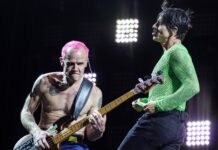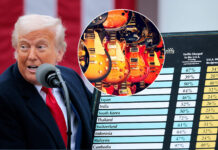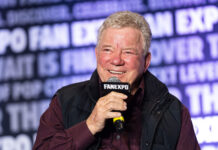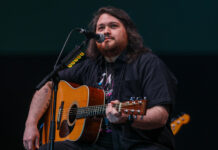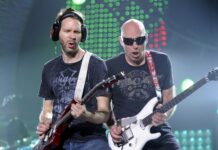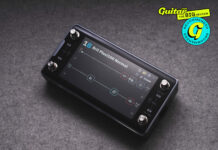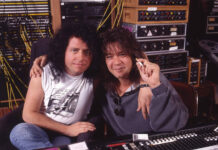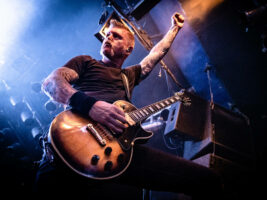
“Maybe I’d move to Japan and try and be an English teacher!” Mastodon’s Bill Kelliher on the future of the band, his love of Les Pauls and what he’d do if he wasn’t in the band
Lead guitarists often garner the most attention through shredding heroics and blazing solos, which are generally positioned at the forefront of rock and metal cuts.
But if you dig deeper, especially in the case of veteran Atlanta, Georgia staples Mastodon; you’ll find swells of dive madness underpinning the group’s sludgy tracks. The riff master at the heart of Mastodon’s controlled chaos is rhythm guitarist Bill Kelliher, a Les Paul (and sometimes Explorer)-wielding maestro with a habit of unfurling blistering riffs akin to a molten groundswell of of a furiously raging volcano.
READ MORE: Is prog-metal shaping the future of the electric guitar as we know it?
Few do it better than Kelliher, who forms a blistering guitar duo alongside fellow six-string heathen Brent Hinds. Over the last 23 years, and across eight crushing records, Hinds has handled the seething solos, while Kelliher has bookended him with iconic riffs akin to Sabbath’s finest hour.
For the uninitiated, all it takes is one listen of the opening swells of Remission‘s Crusher Destroyer, and you’ll be riding Mastodon’s metal-laden train to glory, steaming onward through Hushed and Grim‘s final track, Gigantium.
As he ruminates on his next musical move, we caught up with Kelliher to recount the evolution of his influences, his early love of Gibson single-cuts, his desire to dial back his songwriting approach, and what he might be doing if he wasn’t a member of Mastodon.
How have your guitar influences evolved over the years?
“My guitar heroes started as these big mythical Gods who were untouchable, like Eddie Van Halen, Jimmy Page, and Jimi Hendrix – people I always put up in the clouds on these pedestals. In my mind, those people were born that way, and I thought, ‘I can never reach those levels.’ But as I picked up guitar and started to learn how to play, my idols changed. Those guys will always be up there, but now I’ve got guys like Johnny Ramone, who taught me that you only need one chord and that it’s more about songwriting than proficiency in guitar solos.
“That’s what led me to get my foot in the door as far as playing guys like East Bay Ray from the Dead Kennedys and Greg Ginn from Black Flag. These were guys who had these great power chord riffs mixed with these fucking wild, off-the-handle guitar solos that were beyond pentatonic blues scales. That made me play even wilder, and as I got older, I learned they were actually hitting notes; it wasn’t as random as it sounded.
“So, my musical heroes changed with my progression on guitar, and my needs kept changing. And then I heard James Hetfield, who has such great right-handed picking as a rhythm guitarist; he’s very clean. That’s when I started to be like, ‘Oh, I should really try to play proficiently and cleanly. Maybe I don’t have to be all in with the sloppy punk rock style all the time.’ I learned how to play all these galloping rhythmic patterns of a thrash guitar.
So many guys along the way influenced me, like the ’90s grunge guys and those deep tunings, and then Page Hamilton, who is completely unlike anyone else. And, of course, Buzz Osborne from the Melvins, who still impresses me with his songwriting and riffage. He’s become a close friend of mine, and I’ve looked up to him as a guitarist for my whole life.”
Image: Jospeh Okpako / WireImage
Do new trends in the world of guitar influence you at all?
“I’m almost 52 years old, so not so much. There was a period when I was constantly touring, and even then, I ignored guitar trends. I’m always trying new things and trying to expand what I’m doing, but there are only so many notes on the neck [Laughs]. So, when I try to write stuff, I’m trying to improvise with different tunings and trying to have my fingers land in more unexpected places where they normally wouldn’t. I’ll do all these interesting things, just to see what they do. I’m always incorporating new things, but it’s more from my own experimentation than anything I see outside of that.”
What’s your approach as a rhythm guitarist?
“Writing usually goes one of two ways: I’ve got an idea in my head, and I’ve hummed it into my phone, or I might hear something in a dream, like when I’m asleep. But I have a lot of songs that come to me in the moment while I’m asleep, and then I usually forget them [laughs]. I’ve become too lazy to get out of bed and go down and find my guitar to try to learn it.
“I would say 75 per cent of the time, I’m just spitballing with the guitar, as I don’t read music. I never took any guitar lessons; I’m self-taught. So, I see the guitar differently where I’ll look at the neck and be like, ‘Oh, I know where I want to play something,’ and then I basically experiment once I get a riff going. Then I say, ‘Okay, what’s the next riff going to be?’
I’ve tried to talk myself out of writing great riffs because if you look at a song like Sultan’s Curse, I’ve set the bar pretty high [laughs]. That’s a great opening riff, and I’ll think, ‘Now, what am I going to do after that?’ My natural inclination is to write something above and beyond what I’ve done, which always puts me in a position where I’m stuck. I’m like, ‘Oh, man, nothing’s as good as that. What do I do?’ That makes me put a lot of riffs on the back burner.”
Image: Infernal Impressions
Does keeping it simpler aid in getting over the hump, so to speak?
“It does. Again, I’m not trained, so I always try to focus on writing something complementary to a vocal pattern that might go there. I don’t worry about trying to impress anybody. It’s not always about playing as many notes as you can possibly fit into a fucking measure. It’s about being tasteful and then portraying the emotion of the lyrical content. If you do that, you’re going to get under people’s skin and make them feel like the song is for them, personally.
“With every album, I feel like I’m honing it in a bit more because I always try to set the bar pretty high and try and stick to that philosophy. I feel like there’s never any filler, and I’m proud of that. I don’t know how bands can just release a filler riff or a filler song because, for me, every single song has got to go under a microscope and be tested. I question myself and think, ‘Is this good enough? Does this sound cool? Is this going to be something we’re gonna be playing every night for like the next couple of years?’ I don’t want to be bummed out and be like, ‘Oh, I should have should have written this instead of that.’”
Do you prefer writing in minor or major chords?
“Definitely minor because minor it’s a sadder, more evil-sounding mode. But a lot of times, it depends on a few factors, which can change all of that. It’s like, ‘Am I happy right now? Do I want to write a happy thing?’ If I’m not happy, I might feel like writing stuff that’s a little darker and eviler, just as my go-to thing. I will say that the last few records seem to have come from a place of sadness, depression, and loss.
“There has been a lot of loss going on during the past few records, and I’m kind of over that. I feel like when I write for the next Mastodon record; I want it to be more upbeat. The last record that had more upbeat songs on it was probably The Hunter, and I’d like to get back to that. Songs like that are shorter and more to the point.
Would that alter your approach in terms of the tunings you might use?
“For the last few records, I’ve been sort of fascinated with tuning to D standard and then dropping the D down to C. There are a lot of cool-sounding chords there, which often achieve what I’m looking for. I’ve written a lot of songs lately in that arena, and for that reason, I’m trying to get out of that just because I feel like I’ve been kind of stuck in that tuning. When you get into that mode, it’s easy for everything to begin to sound the same. If you’re using the same chords and the same techniques every time, it gets stale.
“So, I’m trying to force myself to try new things, like tune the high E and the B string to C. God; I’m not even sure what that’s called. I never studied like any of this shit; I just know the names of the strings [laughs]. But that’s okay, though. I’ve gotten this far. To me, it’s all about feeling and doing what feels good to me. What’s cathartic when I’m playing it? There’s something about turning up a guitar really loud, fucking putting distortion on it, and playing it as hard as you can. It feels like you’re on top of the world. It’s like having a superpower.
You’re a Les Paul guy most of the time, can you recall your first Les Paul?
“I remember the first time I picked up a real Gibson; it must have been in the late 80s or very early 90s. It was a wine-red Gibson Les Paul Studio, and I loved it the second I held it. It was something indescribable, like magic. I plugged it into my shitty little Peavy amp, and when I strummed some chords and played a couple of riffs, I was just like, ‘Oh my god, I must have this.’
“That guitar was my brother’s friend’s guitar; he had left it at my house because he was jamming with my brother at the time. I kept taking it out of the case and strumming it even without plugging in, and I just kept thinking, ‘This is incredible. I must have this guitar.’ I ended up trading him a bunch of stuff for it then I had it for a while. I don’t know what it was, but it felt great, and Les Paul guitars have always felt so good to me.”
Image: Aldara Zarraoa / Redferns
What led to your transition to Les Paul Customs?
“When I finally started playing Les Paul Custom guitars, I was like, ‘Wow. This is like the Rolls Royce of guitars.’ If you’ve ever played one, you know how great those guitars feel. They’re heavy but have just the right weight. When I have those guitars in my hands, they just feel so right. Plus, they look really cool [Laughs]. I think a lot of people are attracted to those guitars for those reasons. They play great, they’re made well, and they’re iconic.
If you grew up watching Billy Gibbons, Slash, and Jimmy Page, you know why Les Paul’s are the gold standard. Anybody who’s anybody has played them, and they define rock. So, for me, Les Paul’s are ingrained in my brain, and that’s a huge part of why I love using them. I wasn’t a big fan of the so-called “shape guitars,” I never wanted to have a pointy guitar; I wanted something classic.”
When did Explorers come into the picture?
“Somewhere along the way, after I acquired the wine-red Les Paul, I bought an Explorer because I thought that was the new king of guitars when I saw James Hetfield playing one. I was like, ‘That guitar looks fucking cool. It’s huge. It’s heavy. It just screams fucking hot-rodded badass guitar.’ It’s like a muscle car but in guitar form. Again, I was just like, ‘I must have that.’ I loved that guitar and the Les Paul, but they both were stolen. I did get the Explorer back a few years later, but I was bummed out about losing it initially.”
Image: Per Ole Hagen / Redferns
What combination of amps are you using these days?
“I stick with the signature Butterslax Friedman amps that Dave Friedman built for me years ago. I’ve always loved the way that Friedman amps sound because they sound like a really good Marshall. And there are still some old Marshall’s that I have that sound great, but for the most part, I know what I’m gonna get out of the Friedman. Friedman has just got a sick tone right out of the box; no matter the EQ, it already sounds amazing.
“I started messing around with some Victory amps, which sound very sharp and tight. So, I’ve been using a combination of the Super Kraken Victory with my Butterslax Friedman on the past few Mastodon tours. With that combination, I feel like I’m getting the best of both worlds as far as tonality. I’m always searching for the perfect tone and ensuring there’s no stone unturned, but those are the two I like most right now.
Are Mastodon working on any new music?
“There’s no official announcement or anything, but things are happening. Like I said before, I’m very interested in writing a batch of rapid-fire, heavy songs, kind of like Fallen Torches or Crusher Destroyer. I want to write music that’s really fucking heavy and to the point. I want it to sound like Mastodon but steer away from the long, drawn-out songs. I feel like we’ve been on that kind of kick for a while, and I want to move on to something a little more tangible.
So, I’m messing with a lot of rapid-fire, fucking hot songs that are catchy, memorable, and just kickass. The stuff I’m working on is the sort of stuff that comes out swinging, you know? I’ve been listening to a lot of Turnstile, and their last record, Glow On, to me, is fucking great. I just love their guitars, and their production of it sounds great. Their songwriting is really good. It reminds me of Bad Brains, but if they were more modern, with some Jane’s Addiction mixed in.
Would you say you feel reinvigorated as a songwriter, then?
“In a way, yes. That Turnstile record kind of my interest in writing in that way. It’s like, ‘Well, you guys are bringing back all the cool things about the bands that I used to listen to and really look up to. I wanna do more of that.’ I’m a product of the 80s and early 90s when all that kind of stuff was really popular. You had bands like Primus, Helmet, Smashing Pumpkins, and all this alternative, weird stuff coming out, and that’s where my head tends to go.
“Like I said earlier, I’m nearly 52, and when I want to listen to something that I know is good, and I know I’ll like, I usually go back in time to the ’70s, ’80s, and ’90s, and I’m like, ‘Yeah… this this this fills that void.’ I mean, obviously, as I’m getting older, people are still putting out great records, and maybe I’m at that point where I’m not sure if my tastes are still changing or if they’re staying the same. But occasionally, I’ll hear something from the Melvins or Turnstiles, and I’m like, ‘Wow. What the fuck is that?’”
If you weren’t a member of Mastodon, what might you be doing instead?
“Man, I have no idea what I’d be doing if I wasn’t playing music. God, even if I wasn’t a member of Mastodon, I would have to be doing something music related. I’d have to be writing and recording music. Music is all I really know. I have many hobbies like carpentry, cooking, and languages that inspire me, but I wouldn’t be doing any of them for a living. I don’t know… languages interest me enough that maybe I’d move to Japan and try and be an English teacher [laughs]. Honestly, I have no idea what I’d be doing. I thank God for my parents buying me a guitar when I was 15 years old because I’d be lost in this world with it. Even more lost than I am right now.”
For more information on Mastodon, click here.
The post “Maybe I’d move to Japan and try and be an English teacher!” Mastodon’s Bill Kelliher on the future of the band, his love of Les Pauls and what he’d do if he wasn’t in the band appeared first on Guitar.com | All Things Guitar.
Source: www.guitar-bass.net

